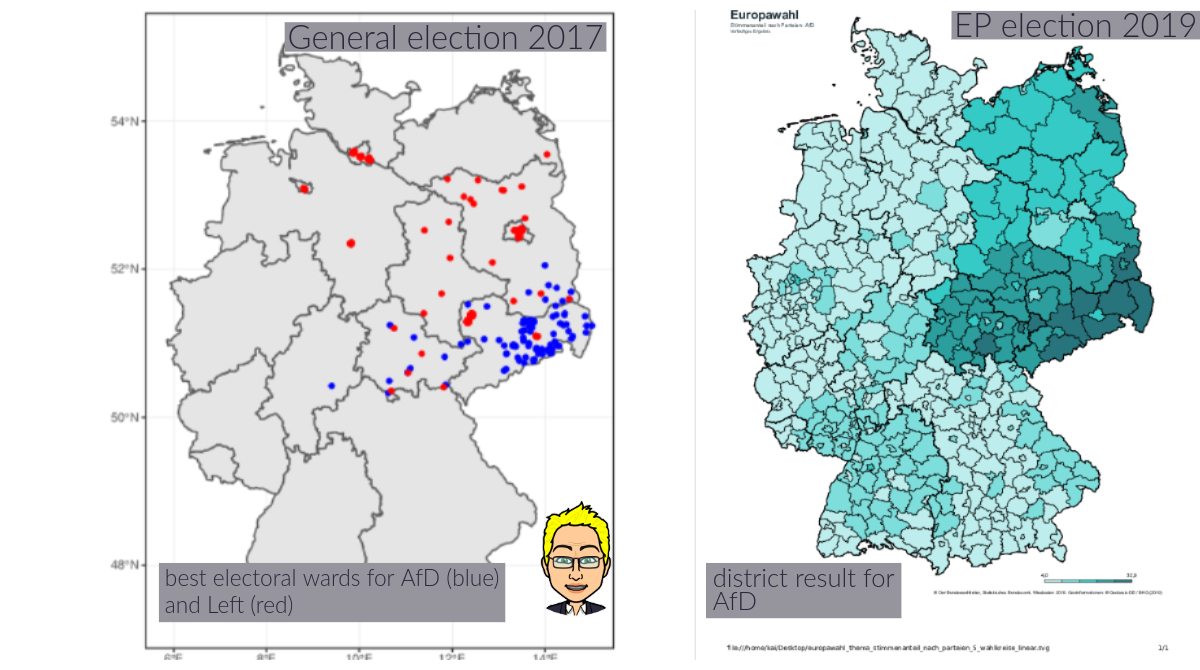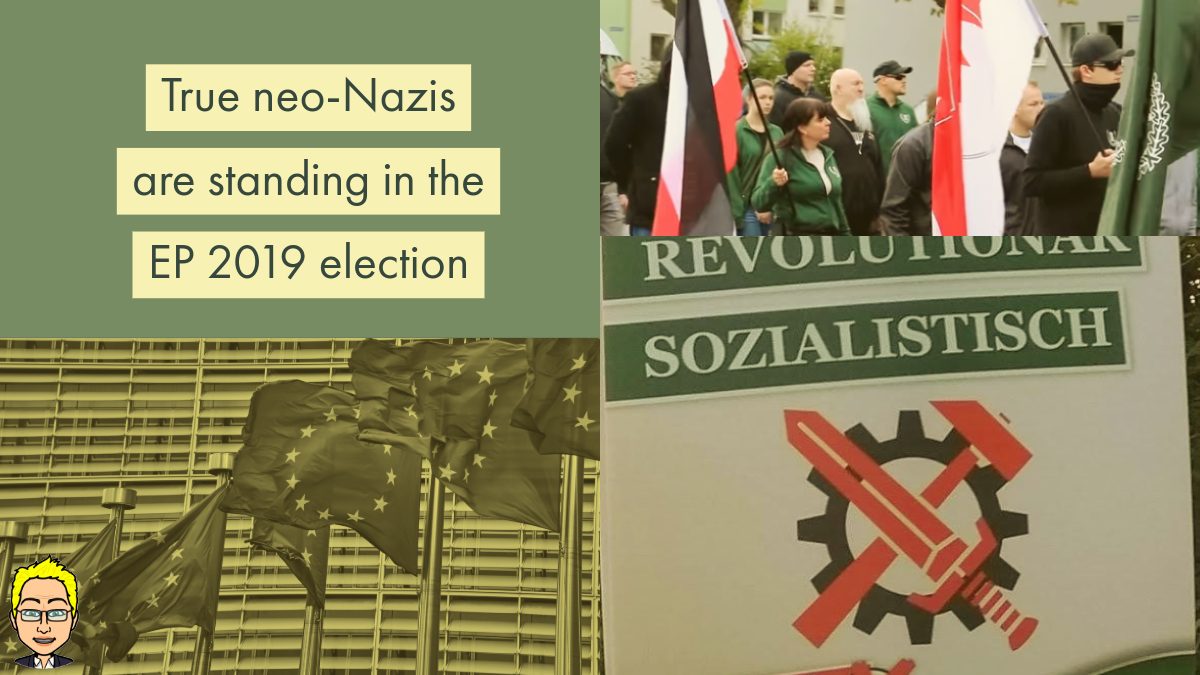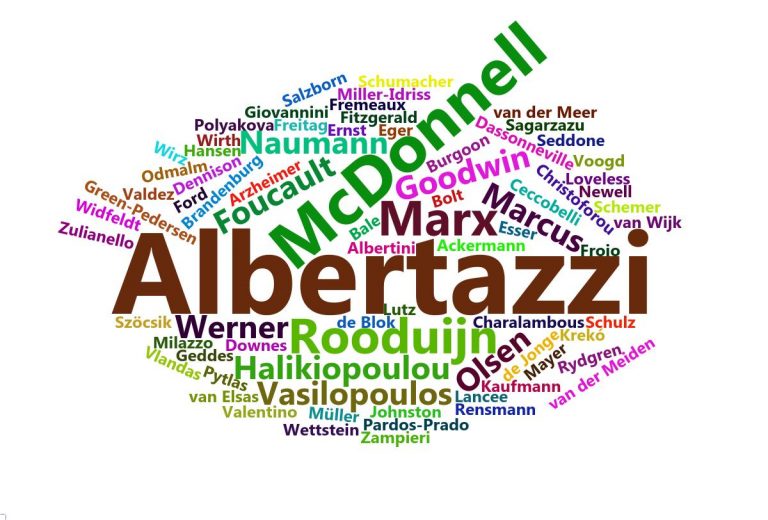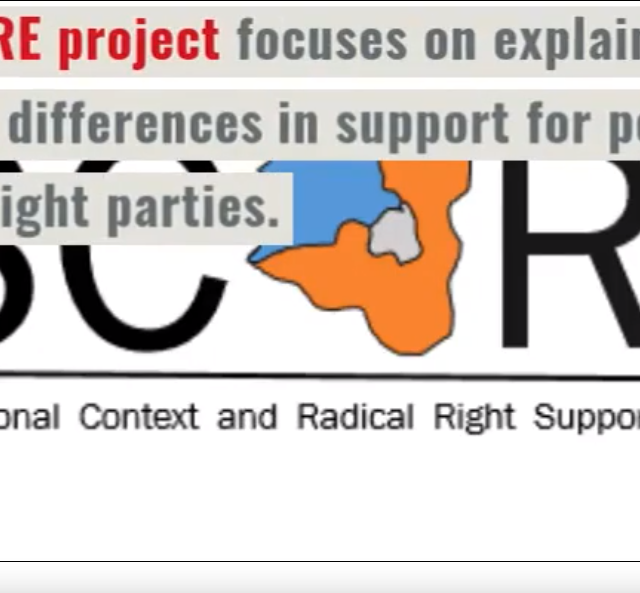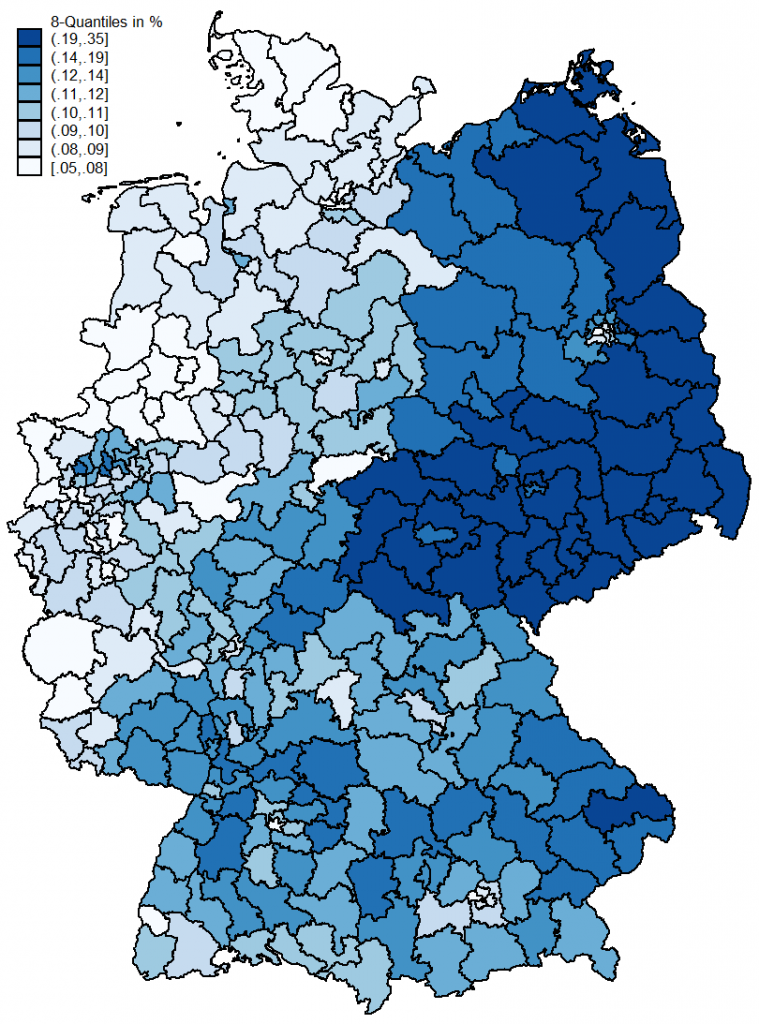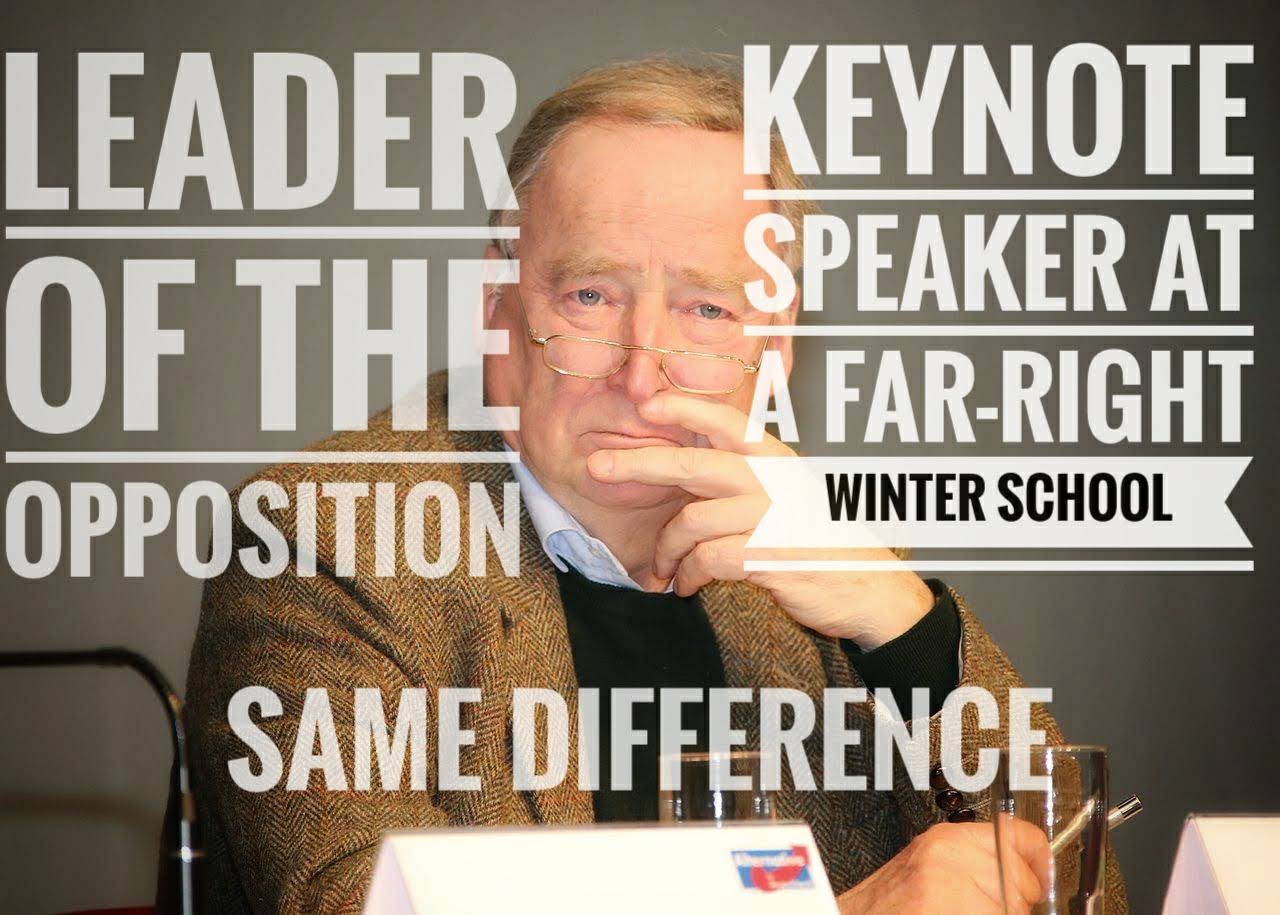What’s new in the bibliography?
It’s that time of the year again. Once more, I have updated the Erratic Extreme/Far/Radical/Populist Right Bibliography. After the book-chapter heavy winter update, we are back to normal: the spring update brings four books, two chapters, and 45 journal articles. Most of these were published in 2018, but some are almost two decades old. Please keep pointing out relevant publications to me.
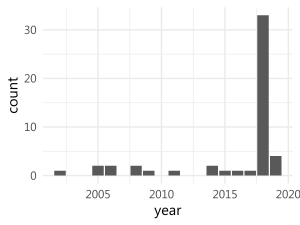
Who has written all the new stuff?
You know what they say about pictures and words. I thought I should give the new-ish wordcloud2 package a spin. Here is the result. Before you get too envious (or too haughty), please remember that scale is proportional to the number of publications, not the word count, and that additions to the bibliography happen on a non-systematic and utterly eccentric basis: if I come across something that interests me, it gets in, whether it is your very first article or your whole back catalogue.
What is this new far right research about?
I stuffed the titles and (where I had them) abstracts into a dataset, forgot some obvious stop words (among? much? however?) and tried some lemmatisation (with mixed success). “Party”, “populist/populism”, and “radical” come out tops. Unsurprisingly, “immigration” is also prominent. But I find some of the smaller words more interesting. “Leave” is certainly a nod to Brexit. “Nord” is considerably smaller than “Lega”, reflecting the nationalisation (or at least the aspiration) of the former regionalists. “Unemployment” is certainly smaller than it would have been a decade or two ago. So is “extreme”. If you are interested in the fine print, click on the image for a larger, high-resolution version.

Follow the robot
If you care about Extreme/Far/Populist/Radical Right research and if you are on Twitter, consider following the Radical Right Research Robot for random updates, serendipitous insights, and the occasional awkward pun.

So: what titles exactly?
Here is the update, in all its glory:
Ackermann, Kathrin, Eros Zampieri, and Markus Freitag. 2018. “Personality and Voting for a Right-Wing Populist Party – Evidence from Switzerland.” Swiss Political Science Review 24 (4): 545–64. doi:10.1111/spsr.12330.
Albertazzi, Daniele. 2006a. “‘Back to Our Roots’ or Self-Confessed Manipulation? The Uses of the Past in the Lega Nord’s Positing of Padania.” National Identities 8 (1): 21–39. doi:10.1080/14608940600571222.
———. 2006b. “The Lega Dei Ticinesi. the Embodiment of Populism.” Politics 26 (2): 133–39. doi:10.1111/j.1467-9256.2006.00260.x.
———. 2016. “Going, Going, …Not Quite Gone yet? ‘Bossi’s Lega’ and the Survival of the Mass Party.” Contemporary Italian Politics 8 (2): 115–30. doi:10.1080/23248823.2016.1193349.
Albertazzi, Daniele, and Duncan McDonnell. 2005. “The Lega Nord in the Second Berlusconi Government: In a League of Its Own.” West European Politics 28 (5): 952–72. doi:10.1080/01402380500310600.
Albertazzi, Daniele, Arianna Giovannini, and Antonella Seddone. 2018. “‘No Regionalism Please, We Are Leghisti!’ the Transformation of the Italian Lega Nord Under the Leadership of Matteo Salvini.” Regional & Federal Studies 28 (5): 645–71. doi:10.1080/13597566.2018.1512977.
Albertazzi, Daniele, Duncan McDonnell, and James L. Newell. 2011. “Di Lotta E Di Governo: The Lega Nord and Rifondazione Comunista in Office.” Party Politics 17 (4): 471–87. doi:10.1177/1354068811400523.
Arzheimer, Kai. 2018. “Conceptual Confusion Is Not Always a Bad Thing: The Curious Case of European Radical Right Studies.” In Demokratie Und Entscheidung, edited by Karl Marker, Michael Roseneck, Annette Schmitt, and Jürgen Sirsch, 23–40. Wiesbaden: Springer. doi:10.1007/978-3-658-24529-0_3.
Bale, Tim. 2008. “Turning Round the Telescope. Centre-Right Parties and Immigration and Integration Policy in Europe.” Journal of European Public Policy 15 (3): 315–30. doi:10.1080/13501760701847341.
Blok, E.A. Lisanne de, and T.W.G. Tom van der Meer. 2018. “The Puzzling Effect of Residential Neighbourhoods on the Vote for the Radical Right an Individual-Level Panel Study on the Mechanisms Behind Neighbourhood Effects on Voting for the Dutch Freedom Party, 2010-2013.” Electoral Studies 53: 122–32. doi:https://doi.org/10.1016/j.electstud.2018.04.003.
Carter, Elisabeth. 2018. “Right-Wing Extremism/Radicalism. Reconstructing the Concept.” Journal of Political Ideologies 23 (2): 157–82. doi:10.1080/13569317.2018.1451227.
Dennison, James, and Andrew Geddes. 2018. “A Rising Tide? The Salience of Immigration and the Rise of Anti-Immigration Political Parties in Western Europe.” The Political Quarterly, online first. doi:10.1111/1467-923x.12620.
Downes, James F., and Matthew Loveless. 2018. “Centre Right and Radical Right Party Competition in Europe: Strategic Emphasis on Immigration, Anti-Incumbency, and Economic Crisis.” Electoral Studies 54: 148–58. doi:10.1016/j.electstud.2018.05.008.
Eger, Maureen A., and Sarah Valdez. 2018. “From Radical Right to Neo-Nationalist.” European Political Science. doi:10.1057/s41304-018-0160-0.
Elsas, Erika J. van. 2017. “Appealing to the ‘Losers’? The Electorates of Left-Wing and Right-Wing Eurosceptic Parties Compared, 1989-2014.” Electoral Studies 50: 68–79. doi:10.1016/j.electstud.2017.09.013.
Ford, Robert, and Matthew J. Goodwin. 2014. Revolt on the Right. Explaining Support for the Radical Right in Britain. London: Routledge.
Froio, Caterina. 2018. “Race, Religion, or Culture? Framing Islam Between Racism and Neo-Racism in the Online Network of the French Far Right.” Perspectives on Politics 16 (3): 696–709. doi:10.1017/S1537592718001573.
Green-Pedersen, Christoffer, and Pontus Odmalm. 2008. “Going Different Ways? Right-Wing Parties and the Immigrant Issue in Denmark and Sweden.” Journal of European Public Policy 15 (3): 367–81. doi:10.1080/13501760701847564.
Kaufmann, Eric. 2019. “Can Narratives of White Identity Reduce Opposition to Immigration and Support for Hard Brexit? A Survey Experiment.” Political Studies 67 (1): 31–46. doi:10.1177/0032321717740489.
Krekó, Péter, and Gregor Mayer. 2015. “Transforming Hungary – Together? An Analysis of the Fidesz-Jobbik Relationship.” In The East European Radical Right in the Political Process, edited by Michael Minkenberg, 183–205. Routledge.
Olsen, Jonathan. 2018. “The Left Party and the Afd.” German Politics and Society 36 (1): 70–83. doi:10.3167/gps.2018.360104.
Rooduijn, Matthijs. 2018a. “State of the Field: How to Study Populism and Adjacent Topics? A Plea for Both More and Less Focus.” European Journal of Political Research, online first. doi:10.1111/1475-6765.12314.
Salzborn, Samuel. 2018. “Antisemitism in the ‘Alternative for Germany’ Party.” German Politics and Society 36 (3): 74–93. doi:10.3167/gps.2018.360304.
Wirz, Dominique S., Martin Wettstein, Anne Schulz, Philipp Müller, Christian Schemer, Nicole Ernst, Frank Esser, and Werner Wirth. 2018. “The Effects of Right-Wing Populist Communication on Emotions and Cognitions Toward Immigrants.” The International Journal of Press/Politics 23 (4): 496–516. doi:10.1177/1940161218788956.

